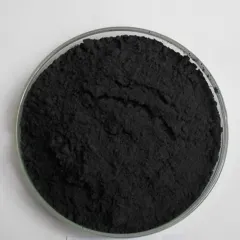- Home
- Products
- Elementary
- Boride Powder
- 3D Printing Powder
- Sulfide Powder
- Oxide Powder
- Carbide powder
- Nitride Powder
- Silicide Powder
- Hydride Powder
- Telluride Powder
- Selenide Powder
- Stearic Acid Series
- Phosphide Powder
- Nanoparticles
- Metal Alloy
- MAX Phase
- Lithium Battery Anode
- Surfactant
- Molecular sieves
- Concrete Admixtures
- Cladding of metals
- News
- Blog
- Contact
- About
High Purity Selenium Se Powder CAS 7782-49-2, 99%
Overview of Selenium Powder :
Selenium is a metal powder with unique physical and chemical properties made from elemental selenium through a specific process. It exists in fine particles and has a wide range of applications. From the point of view of physical properties, selenium powder is a substance with a metallic luster; its melting point is relatively low, and its boiling point is relatively high. It has excellent electrical conductivity as well as good thermal conductivity. It also has electrical properties. In addition, selenium powder has a lower density and is lighter than many other metal powders, making it an advantage in manufacturing certain lightweight materials. Selenium powder is excellent in terms of chemical properties. It is a more active element that can chemically react with various elements to generate various compounds. Notably, selenium powder can react with hydrogen to produce selenium hydride at a certain temperature and pressure. In addition, selenium powder can also react with sulfur to produce selenium disulfide. In a certain dose, selenium powder can be used as an essential trace element of the organism and has an important role in the organism's immune system and metabolic process.

Features of Selenium Powder :
High purity: the purity of selenium powder can reach 99.99%, pure appearance, consistent color, no dirt and other impurities, stable composition, and uniform water.
Excellent physical properties: the density of selenium powder is 4.81g/cm³, the melting point is 217℃, and the boiling point is 684.9℃.
Unique chemical properties: Selenium powder has high photoconductivity, excellent unidirectional conductivity, sensitive photoresponse, and relatively large piezoelectric and thermoelectric effects.
Wide range of uses: selenium powder is mainly used as a catalyst and analytical reagent but can also be used to prepare selenium rectifiers, photocells, photocells, copy radio communication, infrared biphoton, electrostatic copying powder, photography, metallurgy, and other high-purity materials. In addition, selenium powder is also used in rectifiers, photographic exposure agents, metallurgical additives, petroleum work catalysts, copy toner cartridges, selenium-sensitive plates, alloys, and pigments in plastics, paints, enamels, and glass.
Advantages of Selenium Powder :
High purity: As a chemical substance, selenium powder is usually prepared by a fine process to ensure its high purity. This makes it more reliable and accurate in scientific research, industrial applications, and other fields.
Clear chemical properties: As a clear chemical substance, the chemical properties of selenium powder have been thoroughly studied and understood. This allows for more accurate prediction and control of the behavior and effects of a particular chemical reaction or application.
Easy to handle: Selenium powder makes it easier to weigh, mix, transport, and other processing operations. This is very important in industrial production, laboratory research, and other scenarios, helping to improve production efficiency and experimental accuracy.
Wide range of applications: Selenium powder, due to its unique chemical properties, is widely used in many fields, such as semiconductor materials, optoelectronic devices, the glass industry, the rubber industry, and so on. Selenium powder has high practical and economic value in many fields.
Application of Selenium Powder :
Selenium powder is a kind of metal powder with wide application. Its distinctive chemical and physical properties and biological activity make it an important instrument in many fields. The following are the main application areas of selenium powder:
Electronics industry: Selenium powder is mainly used in the electronics industry to make various electronic components, such as selenium batteries, photocells, selenium rectifiers and so on. Selenium powder has good electrical conductivity and optical properties, making it an important application in the solar cell and photoelectric industry. In addition, selenium powder can also be used to make various electronic devices, such as integrated circuits, transistors and so on.
Chemical industry: Selenium powder is mainly used in the chemical industry to synthesize various organic selenium compounds. Organoselenium compounds have good properties for drugs, pesticides and synthetic rubber, so they are widely used in the fields of drugs, pesticides and synthetic rubber. In addition, selenium powder can also be used to synthesize various inorganic selenium compounds, such as selenium sulfide, selenium chloride and so on.
Alloy manufacturing: Selenium powder can manufacture various alloys, such as selenium-copper alloy, selenium-nickel alloy, etc. These alloys possess excellent mechanical properties as well as corrosion resistance. Therefore, they can be used in numerous applications in manufacturing, aerospace, and other areas.
Scientific research: Selenium powder is also widely used in scientific research. For example, selenium powder can be used to make monocrystalline selenium and polycrystalline selenium for studying the crystal structure and physical properties of selenium. In addition, selenium powder can also be used to study the chemical reaction and synthesis methods of selenium.
Other fields: Selenium powder can also be used to make various coatings and additives, such as selenium coatings, selenium coatings, etc., to improve the appearance and performance of products. In addition, selenium powder can also be used to make some polymer materials and composite materials.

Company Profile:
Synthetic Chemical is a trusted global chemical material supplier & manufacturer with over 12 years of experience providing super high-quality chemicals and nanomaterials, including boride powder, nitride powder, graphite powder, sulfide powder, 3D printing powder, etc.
The company has a professional technical department and Quality Supervision Department, a well-equipped laboratory with advanced testing equipment, and an after-sales customer service center.
If you are looking for high-quality Selenium powder, please feel free to contact us or click on the needed products to send an inquiry.
Payment Term:
L/C, T/T, Western Union, Paypal, Credit Card etc.

Shipment Term:
By sea, by air, by express, as customers request.
Storage Conditions:
1) Store in a dry environment at room temperature.
2) Avoid damp and high temperature.
3) Use immediately after opening the inner packing bag.
FAQ:
Q1:
What is the form of selenium?
Inorganic selenium: This is the most important form of selenium in nature, mainly including sodium selenite and sodium selenate. Inorganic selenium is usually obtained from metal deposits' selenium-containing ore powder byproducts. However, inorganic selenium is more toxic and not easily absorbed, so it is unsuitable for direct use by humans and animals.
Organic selenium: This is formed through biological transformation, which combines selenium with proteins, amino acids, polysaccharides, etc., in yeast cells. Organic selenium is generally present as selenomethionine and is a source of selenium permitted for human and animal use.
Nano-selenium: This chemical or microbial conversion method converts the inorganic selenium into a zero valence state, the size of about 100-500 nanometers of selenium particles.
Q2:
What are the physical properties of selenium?
Color and form: Selenium elemental substance usually appears as a gray-black solid with a metallic luster. Of the six known solid allotropes, selenium has three crystal forms, of which the gray hexagonal system is the most stable, with a density of 4.81 g/cm ³. In addition, there are three amorphous solid forms of selenium, including two amorphous glassy forms of red, black, and colloidal selenium.
Hardness: The hardness of selenium is similar to that of sulfur and can reach a hardness level of 2-3 on the Mohs hardness scale. This means that something harder than it, such as glass or coins, can be scratched by selenium.
Melting point and boiling point: the melting point of selenium is 217℃, and the boiling point is 684℃. This means that selenium is solid at room temperature but will melt into a liquid at high temperatures.
Electrical conductivity: Selenium is a semiconductor material with moderate electrical conductivity, and its electrical conductivity changes sharply with light intensity. This allows selenium to make semiconductors and photosensitive materials.
Q3:
What are the chemical properties of selenium?
Electronegativity: Selenium has an electronegativity value of 2.48, which means it has a certain electronegativity and is easy to react chemically with other elements.
Oxidation states: The common oxidation states of selenium are -2, 0, +2, +4 and +6. Selenium occurs primarily in oxidation states +4 and +6, such as sodium selenate (Na₂SeO₄) and selenic acid (H₂SeO₄).
Reactivity: Selenium burning in the air will emit a blue flame and generate selenium dioxide (SeO₂). In addition, selenium can be directly combined with hydrogen, halogens, and metals to form selenides. It can also form compounds with oxygen, sulfur, and other elements, such as selenic acid and selenite.
Alloy formation: Selenium can form alloys with metals, such as selenium-copper alloy, selenium-silver alloy, etc.
Participation in organic synthesis: Selenium can participate in the synthesis of organic compounds, such as selenolefin, selenolefin, etc.
Q4:
The formula for selenium powder?
The chemical formula of selenium powder is Se. Selenium is an inorganic elemental, dark red to black amorphous powder, insoluble in water, hydrochloric acid, and dilute sulfuric acid but soluble in nitric acid, carbon disulfide, benzene, and quinoline. It is mainly used as a catalyst and analytical reagent. It can prepare selenium rectifiers, photocells, photocells, reproduction of radio communication, infrared biphoton, electrostatic copying powder, photography, metallurgy, and other high-purity materials.
Q5:
What are the uses of selenium powder?
Electronics industry: Selenium powder is an important raw material for manufacturing semiconductor materials, such as cadmium selenide, widely used in thermal imaging, night vision, navigation and other fields.
Glass industry: Selenium powder is used as a decolorizing agent in the glass industry to improve the transparency and purity of glass and to manufacture special selenium glass to manufacture high-resolution optical systems.
Ceramic industry: Selenium powder is used to manufacture selenium red ceramics, which have a beautiful red color and stable color and are often used to produce crafts and high-end tableware.
Rubber industry: Selenium powder is used as an antioxidant to improve rubber's heat resistance and aging resistance.
Adhesive industry: Selenium powder can be used as an additive for adhesives to improve adhesives' bonding strength and durability.
Selenium Powder Properties | |
| Additional Titles | Selenium particles, Selenium microparticles, Selenium micropowder, Selenium Micropowder & Micro Micro Micro Micro Micro Micro -Selenium Selenium Powders Submicron, and Selenium Powder |
| 7782-49-2 | |
| Combination Formula | Se |
| Motility | 78.96 |
| Appearance | Black powder or gray powder |
| Melting Point | 217 |
| Boiling Point | 684.9 |
| Density | 4.79 g/cm3 |
| Solubility | N/A |
| Electrical Resistance | 106 microhm-cm @ 0 degC |
| Poisson rate | 0.33 |
| Tensile force | N/A |
| Support | 0.00519W/cm/K @ 289.2 K |
| Thermal Expansion | (25 degC) 37 um*m -1 *K -1 |
| Vickers Hardness | N/A |
| Young-s Modular | GPA: 10 |
Safety & Health Information | |
| Danger | |
| Hazard Statements | H301+H331-H373- |
| Hazard Codes | T |
| Risk Codes | 23/25-33-53 |
| Privacy statement | 20/21-28-45-61 |
| Transport Information | UN3288 |
Inquiry us
PREVIOUS Elementary
High Purity Cobalt Co Powder CAS 7440-48-4, 99%
NEXT Elementary